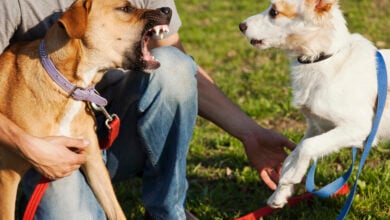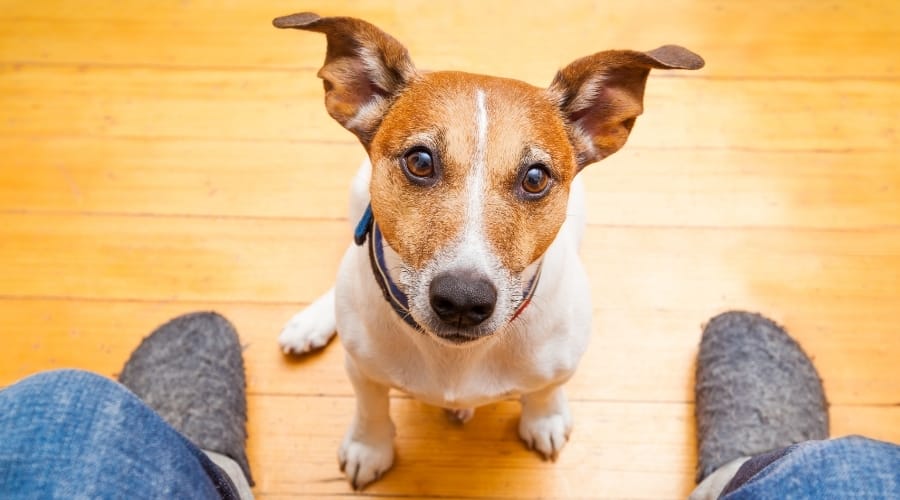Dog Pees When Excited? Welcome To The Splash Zone!
When you purchase through links on our site, we may earn a commission. Here’s how it works.
Your dog sees you. Tail wag. Happy bark. Full-body shake. And then, the golden greeting. If your dog pees when excited, you’re not alone, and your floors have probably smelled better, too.
Table of Contents
This unusual little joy leak is actually quite common, easily fixable, and surprisingly not always a behavioral issue. Here’s why it happens, how to stop it, and how to make every reunion less… splashy.
Is It Normal For Dogs To Pee When Excited?
Normal? Kinda. Convenient? Not even a little.
Excited peeing might feel like a weird party trick, but it’s actually pretty common, especially in shy, sensitive, or young dogs. Think of it as your pup’s nervous system short-circuiting when emotions get too big for their bladder.
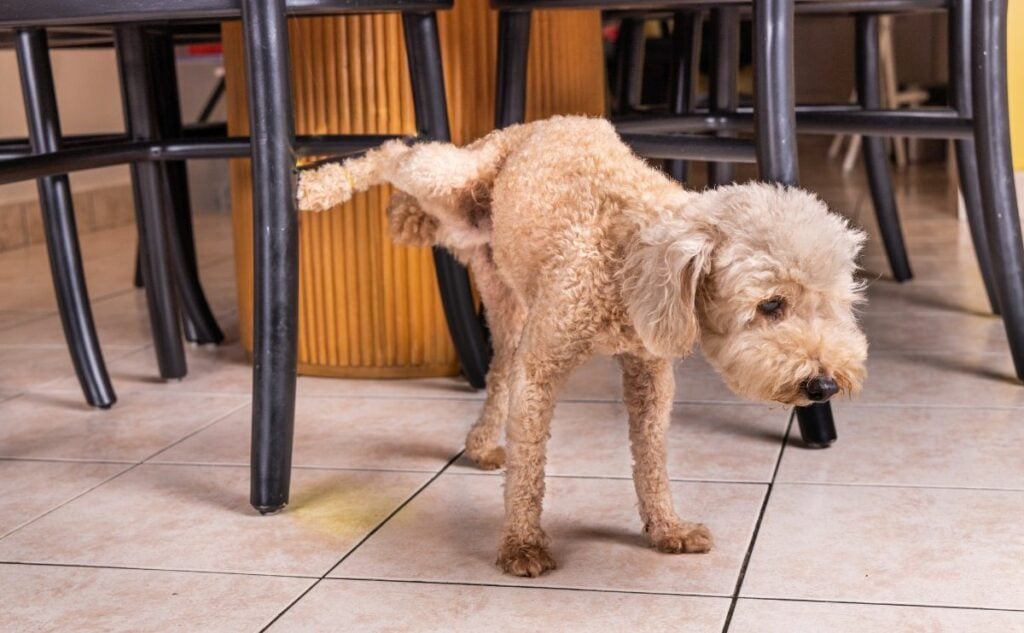
It usually happens when they’re overwhelmed with joy, anxiety, or surprise, like when you come home, grab a leash, or talk in your squeaky dog voice. That said, while it can be harmless, it’s not something to ignore forever.
Sometimes, inappropriate urination is a signal, not just a splash. It can point to underlying medical issues, from UTIs to incontinence to stress-based disorders.
Why Does My Dog Pee When Excited?
If your dog unleashes a “golden greeting” every time you walk in the door, don’t panic. They’re not broken. This bizarre little behavior is officially known as excited urination, and it’s essentially your dog’s way of saying, “I missed you so much I short-circuited.”
Here’s what’s really happening:
- Your dog’s bladder control hasn’t caught up with their brain’s excitement.
- It’s especially common in puppies, high-energy breeds, and dogs under stress.
- The behavior often fades with age, but for some, it becomes their personal brand of affection.
Think of it like this: some dogs jump, some spin, and some… well, leak with love.
No, they’re not mad at you. No, they’re not trying to dominate your hallway. They’re just bladder-challenged extroverts who think you’re the best thing in the world.
Quick Takeaway: If your dog only pees during greetings, playtime, or big emotional moments but not when you’re away or scolding, they’re likely just experiencing excitement-induced urination, not misbehaving.
9 Real Reasons Your Dog Pees When Excited
The next time your dog rolls out the golden greeting, don’t get mad; get curious. Because what seems like a random indoor flood is usually your dog trying to say something. These are the real reasons behind that happy little splash.
1. They’re Overstimulated
Your dog isn’t just excited. You’re basically Beyoncé walking through the front door. It’s all systems go: tail wagging, full-body wiggle, ears up, tongue out, and then… bladder meltdown.
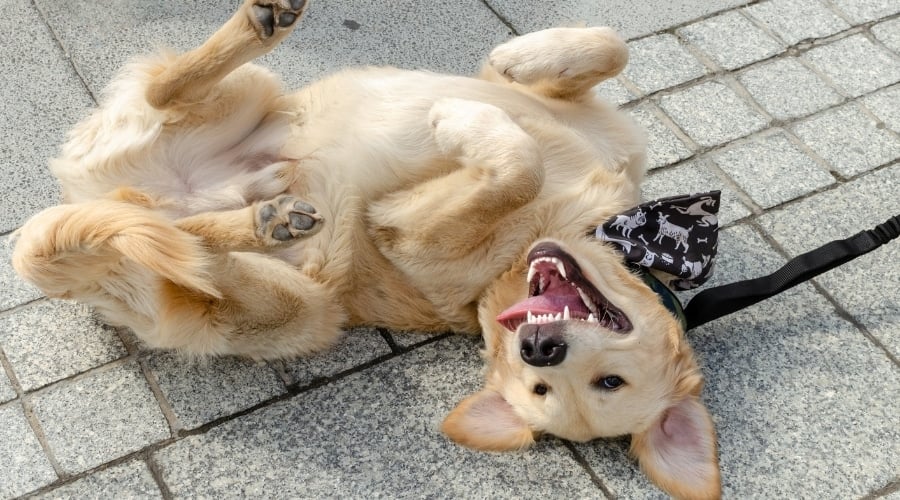
Excited urination happens when your pup’s emotions spike faster than their bladder can handle. It’s not defiance. It’s pure, explosive joy with a leaky side effect.
This is also most common when a pup has not had a potty break in a while, as this makes it harder for a dog to control their bladder.
2. They’re Still a Puppy
Puppies under six months don’t have complete bladder control, especially when they’re thrilled. And while most grow out of it, some dogs (especially small breeds or overly excitable ones) take longer.
Even adult dogs can have “puppy brain” moments when they’re hyped. A visitor arrives? Instant puddle. Grab the leash? Cue the leak. It’s biological, not behavioral.
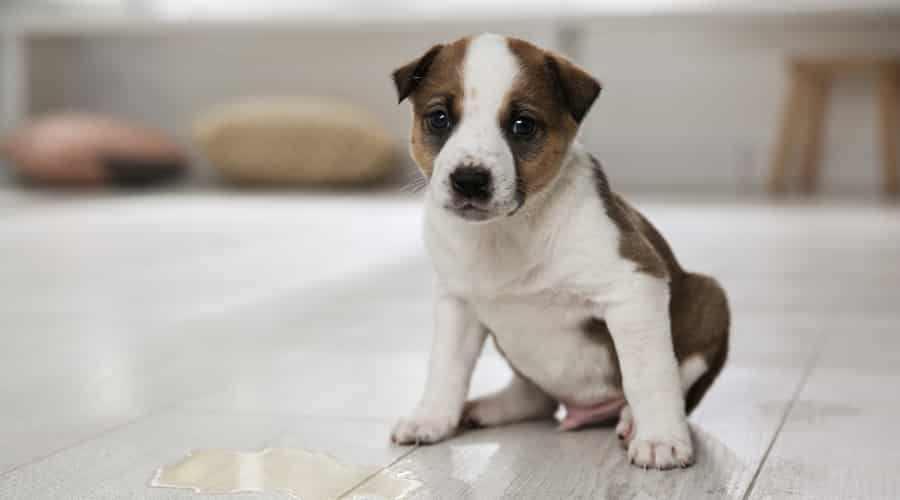
3. They’re Naturally Submissive
If your dog hits the floor, tucks their tail, avoids your gaze, or rolls over, and then pees, that’s not excitement. That’s submissive urination, and it’s your dog saying: “Please don’t be mad, I come in peace and pee.”
This can be because your dog is naturally shy, not properly socialized, or being inappropriately disciplined. It’s often seen in rescue dogs, those with shy personalities, or pups who have had inconsistent or harsh training.
The good news? It’s fixable with confidence-building, not punishment.
Most dogs will outgrow this behavior as they develop a more confident attitude. However, if their submissive urination continues with no end, they may require training to help kick this habit.
4. They’ve Got Separation Anxiety
If your dog pees the second you walk through the door, it might not be a celebration; it could be a sign of stress relief. Dogs with separation anxiety store up tension while you’re gone, then release it all, emotionally and physically, the moment you return.
They’re not doing it “to punish you.” They’re just overwhelmed by the reunion.
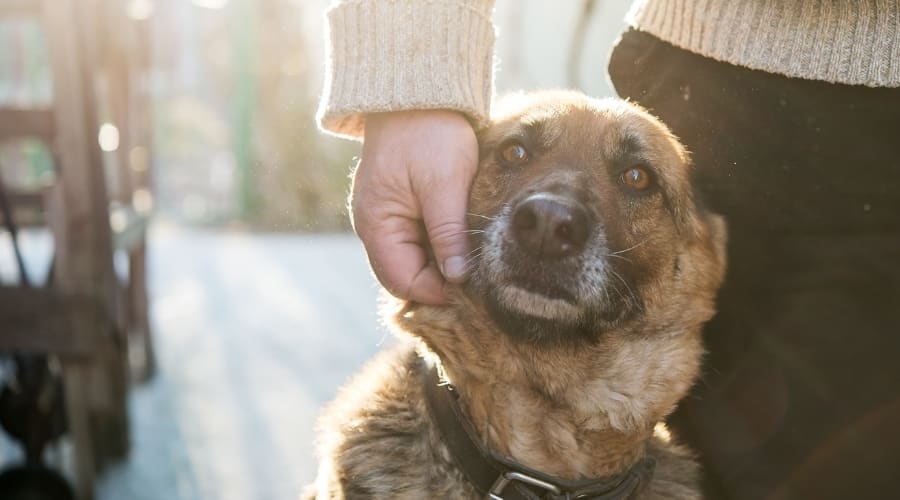
If your dog is peeing inappropriately due to separation anxiety, you will likely see other signs of stress in your canine friend. They may turn to destructive behavior, howl when you are away, or whine uncontrollably when you step in the door. It may be ideal to invest in a dog crate for your anxious pup.
5. They’re Not Fully House-Trained
Sometimes, excited urination is just a matter of bad timing. Maybe your dog doesn’t know how to ask to go out, or they’ve never had consistent training. This is especially true for rescue dogs or pups from shelters where potty habits weren’t a top priority.
The solution? Return to basics with short intervals, positive reinforcement, and outside praise rather than indoor scolding.
6. There’s a Medical Issue You’re Missing
Not all pee puddles are about behavior. If your dog starts dribbling unexpectedly, peeing in their sleep, or going more often, you could be looking at:
- A urinary tract infection (UTI)
- Weak bladder muscles
- Spay-related hormone incontinence
- Even neurological conditions
I reached out to Dr. Amber LaRock, and here’s what she had to say about UTIs and other possible bladder-related causes.
If your dog suddenly begins to pee when nervous or excited, it may be experiencing a UTI or other urinary complications. Sudden onset of inappropriate urination should always be taken seriously, as this means your pup had already mastered controlling its bladder.
This is especially worrisome in older dogs that have never struggled with housetraining. This usually means something is making it challenging to hold their pee.
If your dog is urinating inappropriately due to a UTI, there are some other symptoms you may notice. They may be peeing more than usual, peeing small amounts multiple times, urinating around the house, experiencing strong-smelling urine, and even having blood in their pee.
– Dr. Amber LaRock, DVM, Veterinarian Contributor to Canine Journal
If the leaks happen outside of greetings or you notice new patterns, call your vet for a urine check. Better safe than soggy.
7. They Are in Pain
Dogs can do strange things when they are in pain. A painful pup may experience heightened anxiety due to their discomfort, leading to many potential changes in their behavior. Dogs can experience pain for several reasons, each of which comes with its own unique set of symptoms.
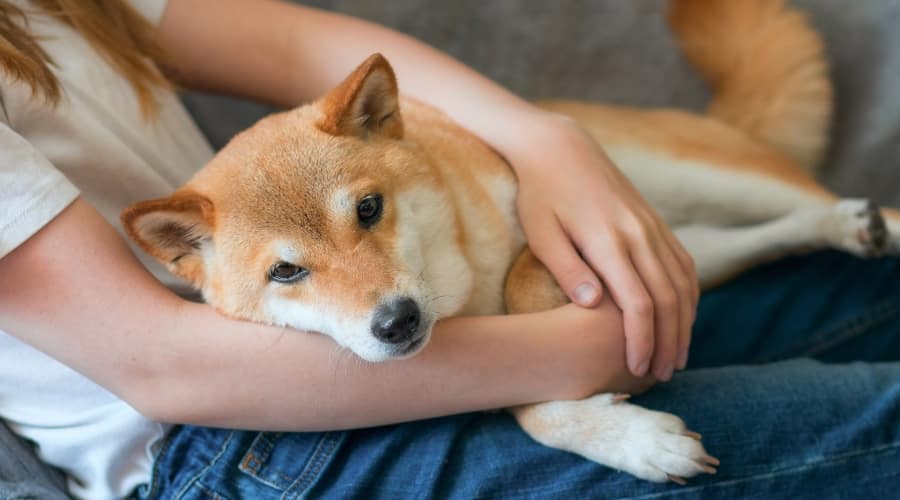
If your dog is suddenly experiencing inappropriate urination, along with any other changes in their behavior, they may be experiencing some type of pain. It’s best to contact your veterinarian for further advice in this situation.
8. They’re Getting Old
If your senior pup begins to dribble urine throughout your home, they may be struggling with incontinence. Similar to humans, dogs can start to have difficulty controlling their bladders as they age.
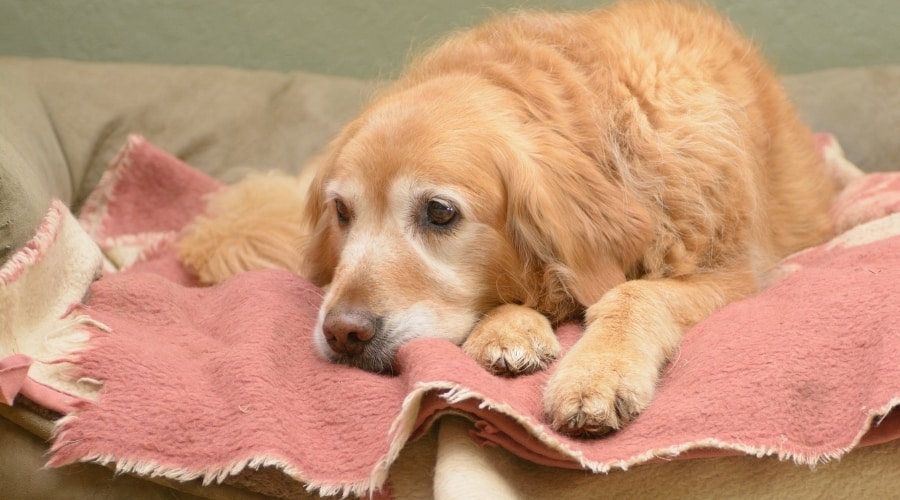
This can make it difficult to refrain from urinating when they get excited, especially if they are not getting enough potty breaks. If your pup seems like they are having a hard time holding it, it’s time to speak with your vet.
9. They Just Really Freakin’ Love You
Some dogs just leak when they love. No fear. No trauma. No bladder problem. Just pure, full-throttle affection that short-circuits their plumbing.
It’s gross. It’s cute. It’s annoying. It’s love. And yes, you can fix it without ruining the relationship.
Quick Tip: If you’re unsure what’s causing the peeing, track when it happens. Greeting only? Likely excitement. During corrections or when approached? Submissive. Random or constant? Vet time.
Dog Urinates When Excited, Or Is It Something Medical?
Sometimes, a puddle at the door is just excitement. But sometimes… It’s a bladder issue disguised as enthusiasm.
If your dog urinates when excited, but it’s happening frequently, at random times, or with no clear trigger, there may be something medical going on beneath the surface.
🚨 Signs It Might Not Be Just Excitement
- Leaking while sleeping or resting
- Peeing often or in small amounts
- Blood in the urine or a strong odor
- Signs of pain (whining, licking the area)
- Accidents even when no one is home
- Regression after being fully house-trained
I spoke with Dr. Amber LaRock again, and she emphasized that underlying medical conditions, such as UTIs or incontinence, can often be mistaken for behavioral peeing.
There are many types of medical conditions in dogs that can cause a dog to urinate more than usual. They may also experience other abnormal urinary habits. This can be due to conditions causing a dog to drink more, which puts a strain on their bladder, or even those affecting their kidneys.
If this is the case, a dog will usually begin to experience inappropriate urination suddenly. They may display other changes in behavior as well. Their urination may not only occur when they are excited or nervous but rather around your home and at any time.
If you think an underlying condition is the cause of their peeing, it’s best to contact your vet for further advice. Your vet can perform diagnostics to get to the root of the issue, and they will then determine the best plan of action going forward.
– Dr. Amber LaRock, DVM, Veterinarian Contributor at Canine Journal
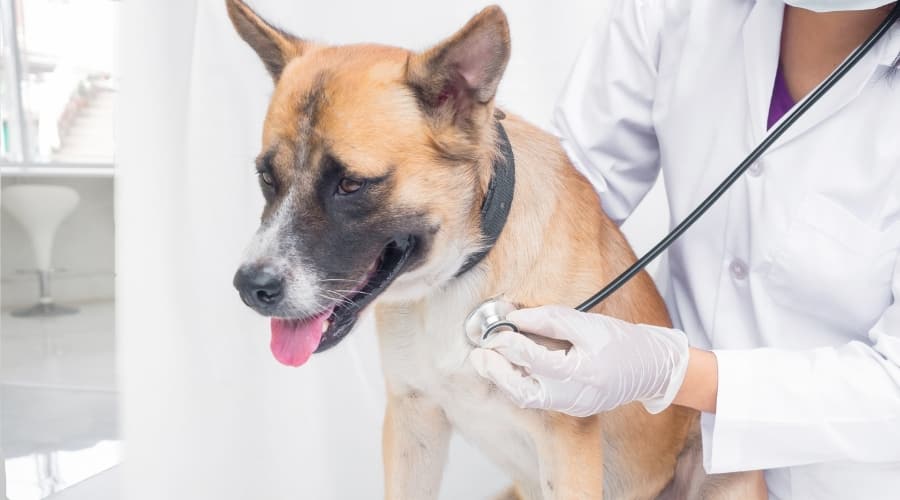
Before diving into training solutions, consider a rule-out vet visit, especially if your dog is older, a new rescue, or is suddenly urinating more than usual. The sooner you spot a medical issue, the easier (and cleaner) your life becomes.
How To Stop Excited Peeing (Without Making It Worse)
You can’t yell the pee out of them. You can’t train it away overnight. And if you scold them after a golden greeting… surprise, it usually gets worse.
But don’t worry, there are fixes. You just have to work with their bladder, not against it.
1. Figure Out What’s Triggering The Pee
Before anything else, pay attention to when your dog pees. Is it when you walk in the door? When guests arrive? When they hear keys? When you get too hyped?
Every dog has different triggers, and solving this starts with knowing exactly what flips their bladder switch. Start tracking their reactions like a detective:
- Time of day
- Who’s involved
- What you were doing
- Where it happened
This helps you figure out if you’re dealing with excited urination, submissive peeing, or something else entirely. Once you know what triggers it, you can start adjusting how you and your dog respond to it.
2. Before You Train, Rule Out the Vet Stuff
Before you dive into behavior fixes, ensure you’re not trying to “train away” a health issue.
If your dog has a UTI, incontinence, or bladder problem, no amount of calm greetings will stop the leaks.
The first step is to work out what’s going on. If you can’t pinpoint the issue, it’s essential to book a quick veterinary check. Your veterinarian can rule out anything serious and save you weeks (or months) of frustration.
If your dog gets a clean bill of health, great! Now, you can focus on behavior with confidence…
3. Make Your Entrance Boring
This one’s huge. When you walk in the door, don’t squeal. Don’t make eye contact. Don’t even say “hi” right away. Just walk in like you’re ignoring your roommate. Boring is your new superpower.
The goal? Teach your dog that your return is no big deal = no emotional overload = no bladder bomb.
If guests are the trigger, prep them to follow the same calm routine. Give them the “act like you’re sneaking past a sleeping toddler” briefing before they ring the bell.
4. Reward Calm, Not Chaos
When your dog finally settles (no jumping, no barking, no pacing), then give attention.
- If they stayed dry? Treat city.
- If they peed? Quiet cleanup, no scolding, no shame.
Dogs are pattern machines. If staying chill gets them love, they’ll start doing that instead.
5. Take Them Out Before The Hype Hits
You know they pee during excitement? Beat them to it. Let them potty before guests arrive, before walk time, or before big transitions.
Keep a timer on your phone that reminds you to do a “pee break” before known triggers (like after work). We also have a guide on how long dogs can hold their pee.
6. Teach a “Place” Cue for Calm Greetings
Train your dog to go to a mat or designated spot when someone enters. Reward them for staying there calmly, even if chaos happens around them.
Over time, this becomes their go-to behavior instead of bouncing (and leaking) all over the place. Calm focus = no bladder blowout.
7. Build Their Confidence
If your dog pees anytime they are nervous, they may need a confidence booster. Insecure dogs often benefit from obedience training, as it helps build their confidence in themselves.
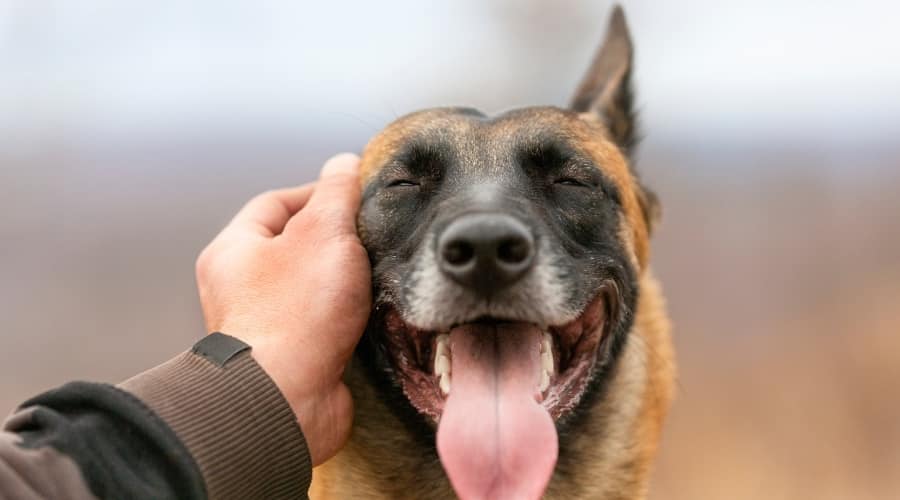
You can help prevent nervous peeing by teaching commands such as sit, lie down, stay, come, shake, and any other tricks you are interested in. Learning basic obedience commands can make a significant difference for an anxious pup.
8. Avoid Any Negative Reinforcement
It may be frustrating to step in a puddle of urine each time your dog is excited or nervous. But it’s important to avoid punishing them in any way. Negative reinforcement can be confusing for a dog in this situation, especially if they are genuinely struggling to control their bladder.
Punishment is especially dangerous for dogs already struggling with confidence, as this can knock them down even further. Helping your dog ditch their inappropriate urination may take time, but it’s important to practice patience throughout the process.
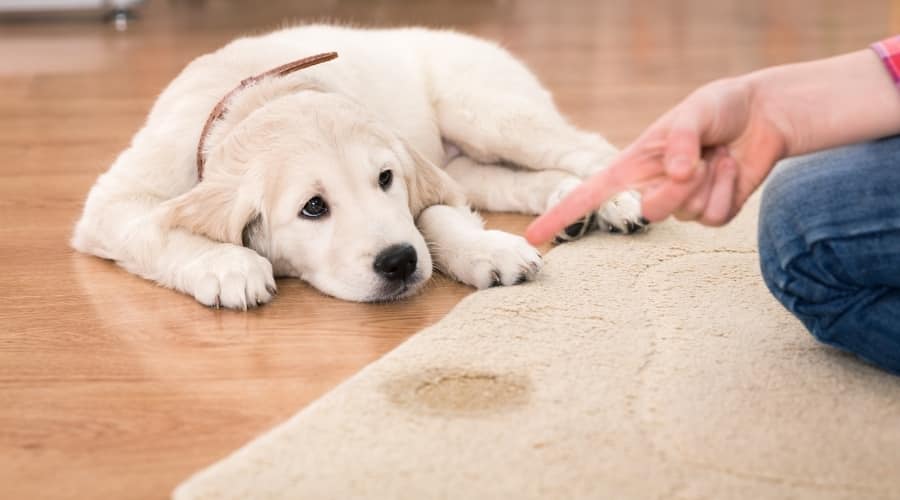
In The Meantime, Try These 4 Management Tools
Training takes time. In the meantime, your floors, couch, or welcome mat might be taking the brunt of the damage. That’s where management tools come in.
They won’t stop the behavior on their own, but they’ll protect your sanity (and your rugs) while you work on it. Here are a few puddle-prevention tools to keep in your toolkit:
1. Doggie Diapers
Doggie diapers are perfect for little dogs who just can’t hold it together yet, literally. These are especially helpful if you live in an apartment or can’t always get them outside quickly.
Pro tip: Look for washable versions with a snug yet comfortable fit to avoid leaks and diaper-related drama.
2. Belly Bands
Male dogs tend to dribble up front, and belly bands wrap around the lower belly to catch accidents discreetly. They’re reusable, easy to put on, and surprisingly effective.
Use them during high-trigger times (guests arriving, greetings, or play sessions).
3. Washable Pee Pads or Absorbent Mats
Place pee pads by entryways, greeting zones, or any usual splash sites. They catch leaks without ruining your flooring, and bonus: you can toss them in the wash or the trash instead of scrubbing your carpet at 7 a.m.
These aren’t just for puppies; they’re for peace of mind during training.
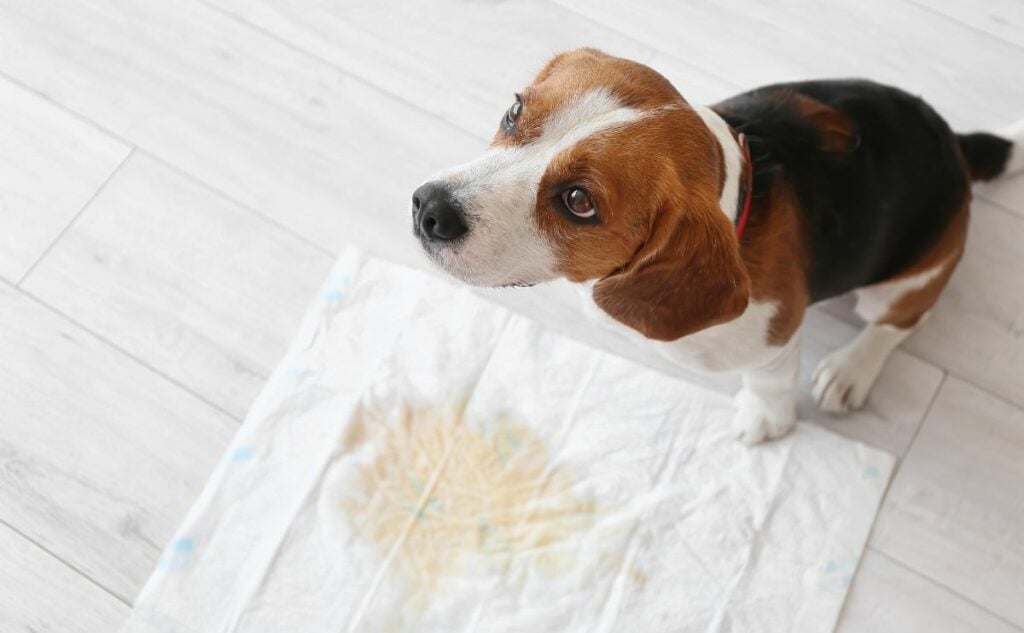
4. Couch Covers
If your dog’s favorite greeting spot is the couch, or if you’re dealing with sudden leaks while cuddling, a waterproof couch cover is your best friend. It keeps your furniture safe and your stress levels lower.
Look for machine-washable options that stay in place and don’t crinkle like a bag of chips.
Bottom Line: These tools aren’t forever. They’re temporary solutions to manage the mess while you build the long-term fix with calm greetings and behavioral work. And hey, if it saves your sofa from becoming a splash zone? Totally worth it.
Our Own Splash Zone Stories
You’re not alone, even our team has been hit by the golden greeting. From first-day rescues to overexcited tail-waggers, we’ve mopped, steam-cleaned, and laughed our way through it too.
My dog, Falkor, a Poodle Beagle mix, is an absolute sweetheart and gets incredibly excited to see us when we come home. It doesn’t matter if we’ve been gone for five minutes or five hours; his joy is always the same. Sometimes, that joy spills over just a bit… literally. It’s never a full accident, just a few drops that sneak out when he’s overwhelmed with happiness.
My Chihuahua used to do the same thing, especially when my husband got home after a long day. She’d do a little happy dance, roll over in pure delight, and yes… leave a tiny, excited sprinkle on the floor. It was never enough to be a big deal, just her way of saying, “You’re finally home!”
While I can’t say I love cleaning up after those moments, I have to admit… It’s kind of touching. There’s something really sweet about a dog who’s so happy to see you, they just can’t contain it. I mean, who else in my life is literally leaking with joy at the sight of me?
These days, if I know one of those joyful reunions is coming, I just try to meet the dogs outside first. That way, everyone gets their celebration, and my carpet stays dry.
– Danielle DeGroot, Dog Mom & Writer for Canine Journal
What Else Is Your Dog Trying to Tell You?
If your dog’s peeing when excited, it’s just one way their behavior might be trying to send you a message, and it’s not the only one worth paying attention to. Your dog’s behavior is a language, and we’re here to help you decode it.
Is your dog panting and pacing indoors, even when it’s not hot? That could be a sign of stress or anxiety, especially if it happens at night or when you’re about to leave.
Does your pup dig obsessively at the carpet, couch, or yard? That might mean they’re bored, anxious, or trying to release pent-up energy in all the wrong places.
Ever catch your dog scooting across the floor like they’re trying to start a fire? It might seem funny, but it could indicate anal gland issues or irritation that require a veterinary check.
And if you’re constantly saying, “Please stop barking!” you’re not alone. But excessive barking can often signal deeper emotional triggers, not just a chatty personality.
Tell Us Your Splash Story! Has your dog ever greeted you with a tail wag and a surprise puddle?
We’d love to hear it. Drop your story in the comments below and let other dog parents know they’re not alone in the splash zone. Let’s turn this into a judgment-free, pee-soaked support group.
